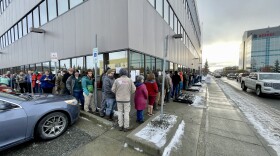-
Despite its name, the Electoral College isn’t so much a body as a process. For decades, a majority of Americans have wanted it changed.
-
Monitoring will focus on the Bethel, Dillingham and Kusilvak Census Areas, as well as the North Slope and Northwest Arctic Boroughs.
-
More than 100,000 Alaskans had already voted by early Monday. That includes early in-person voters, who have exceeded the record the state set four years ago.
-
Though officials will begin releasing first-round results starting shortly after the polls close at 8 p.m. Tuesday, in close races, there’s only so much Alaskans will know on election night.
-
Candidates Mary Peltola and Nick Begich have raised more than $13 million, yet other groups have raised far more to influence the outcome.
-
In rural Alaska, the barriers to participating in the electoral process can be much greater than in urban areas.
-
What’s the best way to educate Alaskans from the diverse neighborhoods and communities of Alaska? We discuss on this Alaska Insight.
-
Kamala Harris and Donald Trump have both appealed to workers. But their stances on many labor issues remain far apart.
-
Democrats and independents are hoping to flip control of the Alaska House. Conservatives are vying to take the Senate.
-
Howe, with the Alaskan Independence Party, is one of four candidates running for Alaska's sole U.S. House seat.
-
U.S. Rep. Mary Peltola is focusing the final days of her reelection campaign on how to slow outmigration from Alaska.
-
John Wayne Howe and Eric Hafner are receiving attention as third options to leading candidates Mary Peltola and Nick Begich.
Alaska Public Media © 2025. All rights reserved.
Play Live Radio
Next Up:
0:00
0:00
Available On Air Stations












